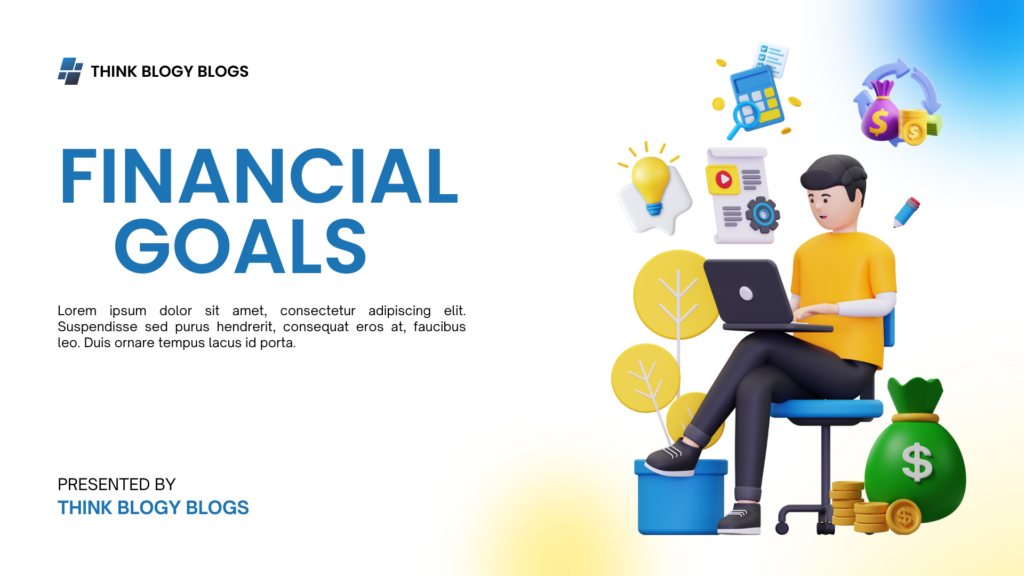It might be quite intimidating to handle personal finance matters, particularly for someone new to it. But managing one’s money is important if one is to attain and maintain financial stability. In this all-encompassing introduction to personal finances, ThinkBlogy will explain some personal finance tips for beginners which will help you work your way up to the ladder of financial success.
1. Begin with a Budget
A very cardinal personal finance tip for beginners is that of budgeting. A budget is a strategy that shows how one carries out his or her spending and saving activities. This means that it is possible to account for any money that enters or leaves the household so that there is no excessive spending or running up debts.
Steps to Create a Budget:
- All the income earning channels should be recorded.
- Record how much you take out every month and focus on even the fixed outgoings (rent, bills) and the flexible outgoings (food, play).
- Ensure needs have priority over wants.
- Set aside some of your income towards savings and an emergency fund.
By drawing up a budget, one is most able to control their expenditure in the short term and look forward to achieving regrettable financial ambitions in the long term. And we at ThinkBlogy believe that a detailed budget drawn on paper and imposed helps develop great financial discipline.
2. Create an Emergency Fund
As a beginner in personal finance, you need to utilise another important personal finance tips for beginners is that of building an emergency fund. Human life is full of twists and turns. Therefore, any form of budgetary estimates encounters a crack with such contingencies as unforeseen medical examinations or car breaks. This, of necessity, is achievable
In other words, an emergency fund is meant to cater for such expenses without necessarily sinking you into debts.

How to Go About Home Making An Emergency Fund At Home:
- The goal should be to save at least 3 to 6 month’s worth of basic provisions.
- Save a small percentage of your pay cheque every month.
- Keep the emergency fund in a separate easy-to-reach account.
It is okay to begin with a little amount, what matters is persistence. Think Blogy recommends that it is best to start simply with the aim of saving something like $500 or $1,000 and increasing the rate thereafter.
3. Minimising debt
Debt can be a very disabling factor towards the achievement of financial goals, that is why one of the best first personal finance tips for beginners is to be debt elimination. Be it student loans or credit card loans or personal loans formulate a strategy and work towards it in order to clear the bills in the shortest time possible.
How to Minimising debt :
- The first step is the most difficult one and so focus on controlling debts with the highest interest rates like credit cards using the avalanche method.
- Looking at the snowball strategy where small debt is cleared first to create the spirit to tackle bigger debts.
- When that becomes inevitable given the present circumstances, refrain from incurring extra debt.
ThinkBlogy advises monitoring your debt repayment achievements from time to time to enhance your motivation. After a while, you shall be free from debts whereby you will enjoy the freedom to save and invest money.
4. Begin Contributing Towards Your Retirement When Young
You can never begin saving for retirement too soon, which is why this is amongst the most practical personal finance tips for beginners is first time savers. The earlier you begin, the more time there is for your money to earn investment income from compounded interest.
Retirement Saving Tips:
- If your employer provides a 401(k) or similar scheme, do not let it go to waste – especially when they offer match funding.
- If you do not have a job offering a pension, get yourself an IRA (Individual Retirement Account) as early as possible.
- Even if it is in the early stages, attempt to allocate some percent of your income in the savings retirement plans.
ThinkBlogy stresses the importance of the benefits of compound interest. When you start saving in the 20s or even 30s, it is the earned interest on the savings contribution which helps out the most.
5. Stay within Your Financial Limits
Another useful and practical personal finance tip for beginners is to spend less than what you earn. This does not mean you should not have fun, it only means pay attention to what you buy. By ensuring that you spend only a certain percentage of your income or less, you leave a portion of it that can be used to save or invest in the future.
Ways to Stay within Your Financial Limits:
- Refrain from increasing your luxury spending as your income rises.
- When deciding on something to purchase, always prioritise needs over wants.
- Avoid impulsive buying – practice waiting, and working hard to earn enough money for that item instead of buying it on credit.

ThinkBlogy is of the opinion that if you adopt a simple lifestyle, the chances of experiencing financial problems because of poor management are slim and you will be able save and invest for a longer period of time.
6. Know What is Credit and How to Spend it Wisely
Credit is an important factor of your personal finance tips for beginners which helps one borrow funds for large purchases like a house or a vehicle among other things. One of the fundamental personal finance tips for learners is to know how to create and preserve good credit.
Credit Management Tips:
- Timely bill payment – making late payments will affect your credit score negatively.
- Use your credit limit conservatively (preferably under 30% of available credit).
- Obtain and review your credit report periodically for any inaccuracies.
ThinkBlogy advocates for the responsible use of credit, promoting the need to borrow only that which one can repay in due time. Having good credit history at a young age will in most cases work to your advantage in financial matters in the future.
7. Set Financial Goals
It is important to define specific, attainable financial targets in order to keep the desire to persevere and the focus on achieving one’s personal financial management. In the absence of goals, it is quite simple to forget one’s position on a given progress scale.

Applications of Financial Goals:
- Short-term goals (Saving money in order to go on a holiday, repaying a credit card).
- Medium-term goals (Buying a house, saving up some cash to pay as a deposit, setting up a fund for rainy days).
- Long-term goals (Retirement planning, making investments).
ThinkBlogy insists that you extend your goals into the small, practical segments that you can work on. This means they will not be hard to accomplish and you will be able to monitor your progress.
8. It is advisable to start investing as soon as possible
A major part of wealth accumulation involves investing. Therefore, one of the excellent personal finance tips for beginnersis investing as early as possible. It is important to understand that even the smallest capital put to investment early on has greater chances of appreciation, owing to the effects of compounded earnings.
Investment Tips for Beginners:
- Clearly set your investment goals.
- Start with low-risk investments like index funds or ETFs.
- One-third of your portfolio should be in cash or cash-like instruments.
- Monitor any trends in the market and any possible areas of investment.
ThinkBlogy on Money encourages you to choose which areas of investment you would like to focus on and how much you want to invest, and to start with a bubble. The bubble is an invention for people who find it hard to start investing.
9. Keep Readjusting Expectations
It is common among novices to get attached to the idea of spending ‘x’ and taking in ‘x’’ while picturing neither as an uncomfortable loss. As one of these explanatory notes in the inner self of beginners might convey, investment planning in personal affairs means devising means of overcoming inflation at less stressful standards than outright contrasting figures with their values at each budgeting cycle.
How to Track Your Finances:
- Keep a monthly account of any expenses not exceeding a defined threshold.
- Utilise budgeting applications and spreadsheets to record expenditures and income.
- Take the time to check progress against financial goals on a monthly or quarterly basis.
- Self-evaluate progress towards financial objectives, and refocus on effective strategies, where financial forecasts have changed.
Here at ThinkBlogy, we advocate the need for holding horses. You will remain focused on your goals by checking your progress against the targets set in your financial plan frequently.
Conclusion
It is known that discipline is paramount in controlling expenses and maximising savings. These personal finance tips for beginners will set you on the right path towards attaining a stable financial outlook. Such measures include, budgeting, debt relief, establishing an emergency fund, and beginning to invest at an early age, and so on, all of which can improve one’s economic situation greatly.
With ThinkBlogy, we assist you in realising your financial objectives by providing you with actionable information and authoritative advice. Tiny disciplines, regular practice and expand your
Read More…………….


